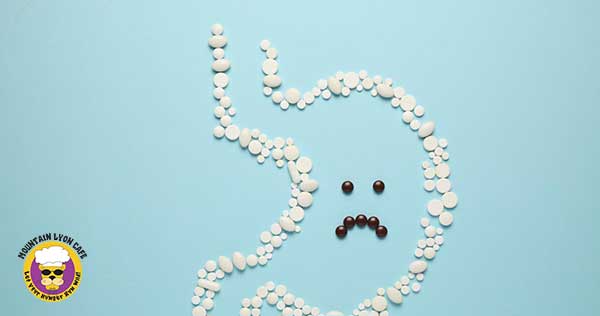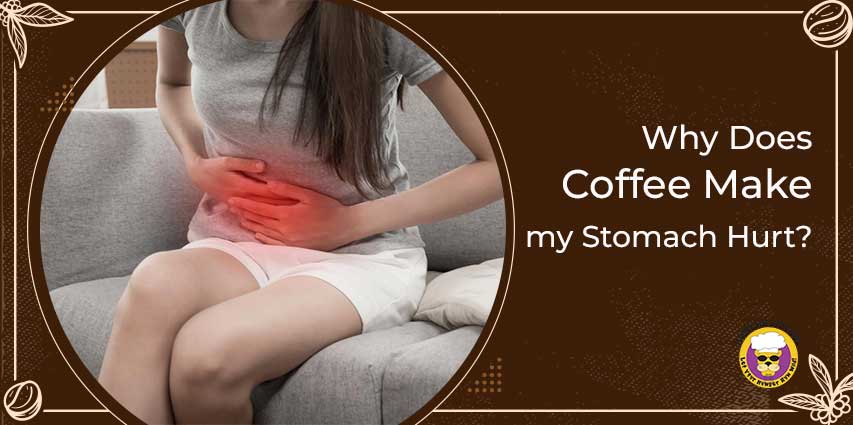Why Does Coffee Make my Stomach Hurt? If you’re like many people, coffee is a regular part of your routine. But do you ever suffer from stomach issues after drinking it? You’re not alone! Many people report discomfort in the form of bloating, nausea, burning sensations, and even vomiting after they consume caffeinated beverages. While some are perfectly fine with drinking coffee or tea on an occasional basis, others find themselves dealing with the negative effects frequently or even every time they indulge in caffeine-containing drinks.
What’s a Gastritis?

Gastritis is a medical term for inflammation of the stomach lining. When this occurs, it can cause pain in the abdominal area, nausea, and vomiting. It’s also possible to experience heartburn or acid reflux as a result of gastritis. Gastritis is often caused by an infection (such as H. pylori), excessive alcohol consumption, or the use of certain medications. However, it’s also possible to develop gastritis from drinking too much coffee or tea.
Coffee and Tea Can Be Hard on Your Stomach?
Caffeinated beverages like coffee and tea contain tannins, which are naturally occurring compounds that can irritate the lining of your stomach. In addition, they stimulate the production of stomach acid and can cause discomfort or pain. Some people are more sensitive to the effects of caffeine than others, which is why even small amounts of coffee or tea can cause problems for some individuals.
Related arrticle: How much ground coffee per cup?
How to Reduce Negative Reactions to Coffee?
If you find that coffee makes your stomach hurt, there are a few things you can do to reduce the discomfort. First, try drinking decaffeinated coffee or tea instead of regular coffee. If that doesn’t work, consider cutting down on the amount of coffee or tea you’re drinking. You may also want to experiment with different brewing methods and brew times to see if they make a difference.
Why Does Coffee Make my Stomach Hurt?
The exact reasons why coffee makes your stomach hurt varies from person to person, but the most likely culprits are caffeine and tannins. Caffeine can irritate the digestive system and cause an increase in stomach acid production. This can lead to acid reflux, heartburn, and other forms of discomfort. Additionally, tannins may also contribute to abdominal pain by increasing the secretion of bile salts into the intestines, which can irritate the lining of the intestines.
The unique chemical composition of coffee can also play a role in its effects on your stomach. For example, coffee contains oils that can stimulate the muscles of the GI tract and lead to cramping, while certain components of the beverage are known to slow down digestion and make it more difficult for food to pass through your system.
Another factor is how much coffee you’re drinking.
Consuming too much coffee in a short period of time can overwhelm your digestive system and cause pain, bloating, and nausea. Lastly, people with existing digestive issues may be more sensitive to the effects of caffeine and tannins in coffee, leading to increased stomach discomfort.
Why Does Coffee Make my Stomach Hurt?
Overall, the reasons why coffee can make your stomach hurt are complex and varied. For some people, it may be due to the caffeine or tannins in the beverage, while for others it may be due to their individual sensitivity to certain components of the drink. Additionally, drinking too much coffee at once or having a pre-existing digestive condition can also contribute to the stomach pain.
Fortunately, there are ways to reduce your risk of experiencing adverse reactions to coffee. Try limiting your caffeine intake and avoiding drinking large amounts of it in a short period of time. Additionally, adding milk or sugar to coffee can help decrease the bitterness from tannins and make the beverage more tolerable for your stomach. Finally, if you’re struggling with frequent digestive issues, it may be a good idea to talk to your doctor about switching to decaffeinated coffee as a safer alternative.
Why does my stomach growl whenever I drink coffee?
It’s possible that the caffeine in your coffee is causing an increase in gastric activity, which can result in loud noises like growling. Additionally, if you’re drinking a large amount of coffee at once, it may also be stimulating the muscles of your digestive system and leading to more pronounced stomach sounds.
To reduce this effect, try limiting your caffeine intake and drinking smaller amounts of coffee in a single sitting. Additionally, adding milk or sugar to the beverage can help reduce its bitterness and make it more tolerable for your stomach.
If you’re still experiencing stomach growling after reducing your caffeine intake, talk to your doctor as it may be an indication of an underlying digestive disorder.
How to stop stomach growling: Top 10 natural remedies
- Ginger: Ginger has been used for centuries to aid in digestion and settle stomachs. It can also help reduce the symptoms of acid reflux and heartburn, as well as bloating and gas. You can drink ginger tea, chew on fresh ginger slices, or take a supplement to get the digestive benefits of this powerful root.
- Chamomile: Chamomile tea is known for its calming properties, but it also has an anti-inflammatory effect on the stomach that can help reduce growling. Drink a cup of chamomile tea before meals or when you’re feeling bloated or gassy.
- Coconut water: Coconut water has the ability to soothe and cool an irritated digestive system. It’s also packed with electrolytes, which can help rehydrate your body if you’re feeling dehydrated from drinking too much coffee.
- Fennel seeds: Fennel seeds can reduce stomach pains and intestinal spasms associated with colic, irritable bowel syndrome, and other digestive issues. Chew on a small amount of fennel seeds after meals to help settle your stomach.
- Yogurt: Yogurt is full of beneficial probiotics that can restore the balance in your digestive system and reduce growling. Make sure to choose plain yogurt with active cultures for maximum effect.
- Baking soda: Mixing a teaspoon of baking soda in a glass of water can help neutralize stomach acid and reduce growling. However, be sure not to exceed the recommended limit of one teaspoon per day, as too much baking soda can have the opposite effect and irritate your digestive system even further.
- Apple cider vinegar: ACV has antibacterial properties that can help reduce stomach growling and other digestive issues. Mix a tablespoon of apple cider vinegar in a glass of water and drink it before meals to settle your stomach.
- Peppermint tea: Peppermint has been used for centuries to promote digestion by relaxing the muscles of the digestive system and reducing gas. Drink a cup of peppermint tea before meals to help reduce stomach growling.
- Licorice root: Licorice root has anti-inflammatory properties that can help soothe an upset stomach and reduce bloating and discomfort. You can drink licorice tea or chew on fresh licorice root to reap the benefits.
- Bananas: Bananas are packed with potassium, which could help reduce stomach growling. They are also high in fiber and can help keep your digestive system regular and functioning properly. Eat a banana or two before meals to ease digestion.
Which types of coffee are easy on the stomach?
When it comes to coffee, lighter roasts are typically easier on the stomach than darker roasts. This is because dark roast beans often contain a higher concentration of acids and oils, which can be irritating for some people. Additionally, some varieties of coffee have been specifically designed to reduce acidity and bitterness by using different brewing methods.
Why does my stomach hurt after drinking carbonated drinks?
Carbonated drinks can be harsh on the stomach because of their high acidity and sugar content. This can lead to feelings of bloating, gas, and discomfort. Additionally, carbon dioxide (the gas that makes them fizzy) can irritate the lining of the stomach, leading to pain and nausea. To reduce this discomfort, it is best to avoid carbonated drinks or limit your intake.
What are some other natural remedies for stomach growling?
- Fennel: Fennel has antibacterial and antispasmodic properties that can help relieve stomach cramps, bloating, gas, and other digestive issues. Chew on a small amount of fennel seeds after meals to prevent stomach growling.
- Ginger: Studies have shown that ginger can help relieve digestive discomfort and reduce stomach growling. Drink a cup of fresh ginger tea or chew on a small piece of fresh ginger root before meals to reap the benefits.
- Cinnamon: Cinnamon is known for its ability to soothe an upset stomach and reduce gurgling. Add a teaspoon of ground cinnamon to your favorite tea or sprinkle it on oatmeal for an extra digestive boost.
- Chamomile tea: Chamomile is loaded with flavonoids that can help relax the muscles in the digestive tract, reducing bloating and discomfort. Drink a cup of chamomile tea before meals to help ease digestion and reduce stomach growling.
- Probiotics: Taking probiotics can help restore balance in the gut and promote regular digestive function, thus reducing stomach growling. You can find probiotic supplements at most health food stores or take natural sources such as yogurt or kimchi.
- Baking soda: Baking soda is alkaline and can help neautralize acid in the stomach. Add a teaspoon of baking soda to a glass of water and drink it before meals for relief from stomach growling. However, be sure not to
- Prebiotics: Prebiotics are plant fibers that help stimulate the growth of beneficial bacteria in your gut, which can help reduce gas and bloating. You can find prebiotic supplements at most health food stores or take natural sources such as bananas, onions, garlic, apples, and oats.
- Avoiding trigger foods: Certain foods are known to cause stomach growling and discomfort. These include dairy products, fatty foods, spicy foods, caffeine and carbonated drinks. It’s best to limit or avoid these foods if you are experiencing stomach growling.
- Eating slowly: Eating too quickly can cause the digestive process to be rushed, leading to gas and bloating. Take your time with meals and chew each bite thoroughly before swallowing to ensure proper digestion and reduce stomach growling.
- Exercise: Moderate exercise can help stimulate digestion and reduce stomach growling. Take a brisk walk after meals or try some gentle yoga poses to encourage proper digestion.
Is it healthy to drink coffee every day?
The short answer is yes, drinking coffee every day can be part of a healthy lifestyle. Coffee contains antioxidants that can help protect against certain diseases, and studies have shown that moderate coffee consumption (1-4 cups per day) may actually reduce the risk of certain health issues such as diabetes, heart disease, and Alzheimer’s. However, you should be mindful of the amount of coffee you are drinking, as too much caffeine can lead to a variety of unpleasant side effects.
It is also important to pay attention to the type and quality of coffee you drink, as some coffees can contain unhealthy additives or high levels of sugar that could negate any potential health benefits. As with all things, moderation is key. If you find that your coffee consumption is interfering with your sleep or causing other adverse reactions, it may be best to reduce your intake, switch to decaf, or limit your intake.
Your Stomach Is Sensitive To Coffee’s Acids And Caffeine
Yes, your stomach is sensitive to the acids and caffeine in coffee, and it can cause digestive issues such as heartburn or stomach upset. If this is a concern for you, try switching to decaf or reduce the amount of coffee you drink each day.
Your Stomach Is Sensitive To Coffee’s Caffeine
Yes, your stomach is sensitive to the caffeine in coffee, and it can cause digestive issues such as heartburn or stomach upset. If this is a concern for you, try switching to decaf or reduce the amount of coffee you drink each day.
You’re Drinking Coffee On An Empty Stomach
Drinking coffee on an empty stomach can cause an increase in acid production, resulting in digestive issues such as heartburn or stomach upset. To avoid this, try having a light snack before drinking your coffee or switching to decaf.
4 Ways To Stop Coffee From Upsetting Your Stomach
- Drink coffee with food: Having food in your stomach can help balance the acidity of the coffee and reduce digestive discomfort.
- Opt for decaf: Decaffeinated coffees have lower levels of caffeine, which can reduce stomach irritation.
- Don’t drink it toolate in the day: Caffeine is a diuretic, so it is best to avoid drinking coffee too late in the day to prevent waking up during the night with a full bladder.
- Avoid adding sugar and cream: These additives can further increase acidity and make the coffee harder to digest.
Caffeinated Drinks and Their Connection to Stomach?
Caffeinated drinks can have an effect on your stomach, as caffeine is a diuretic and can cause dehydration. This lack of fluids can lead to upset stomach and heartburn. It is also important to note that caffeinated drinks are acidic in nature, which can further increase the acidity levels in your stomach. To reduce this risk, try drinking decaffeinated coffee or tea, and also limit your overall consumption of caffeinated beverages.
Are Certain Types of Coffee Easier on Your Stomach?
Yes, some types of coffee can be easier on your stomach. Cold brew coffee tends to have less acidity than other forms of coffee and is therefore less likely to cause digestive issues. Additionally, adding milk or cream to your coffee can help reduce its acidity as well.
I’m Kara Chavez, and I love coffee. I like to create some of the best coffees around – espressos, lattes, macchiatos – you name it. I strive for perfection in my coffee-making skills, and I take great pride in providing a delicious cup of joe to my customers.
I’ve been working in the coffee industry for years now, and I know everything there is to know about making a perfect cup of coffee. My passion for coffee shines through in every cup that I make, and I hope that you’ll stop by soon so that I can share my love of coffee with you!

